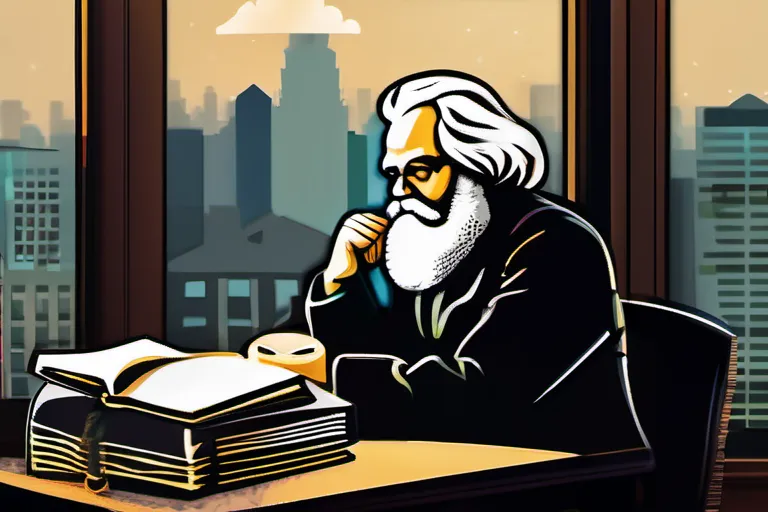Explore the unique perspectives of Karl Marx on religion and how they differ from other religious beliefs.
Karl Marx, a renowned philosopher and economist, had a distinct viewpoint on religion that set him apart from others. In this article, we delve into his perspective on religion and how it differs from traditional religious beliefs.
The Role of Religion in Capitalist Society
Imagine religion as a vast, ancient forest, its trees towering and intertwining like the complex systems of capitalism. For Karl Marx, this forest wasn’t just a place of spiritual solace but rather a mechanism that masked the true nature of society—a capitalist society where the rich are few, and the poor many. How does one reconcile such a view with the traditional understanding of religion as a source of comfort and hope for the oppressed?
In his writings, Marx argues that religion serves as an ‘opiate of the masses,’ dulling their perception of the harsh realities of life under capitalism. This opiate analogy is both striking and subtle; it suggests that while religion might provide temporary relief or distraction, it ultimately keeps people from addressing the root causes of their suffering. Is this a harsh condemnation of faith? Not necessarily. Marx acknowledges that religion can offer consolation to those in distress, but he questions why such solace must come at the expense of truth and action.
Consider the metaphor of a physician who prescribes painkillers instead of curing the illness. Does it truly address the problem or merely ease its symptoms? For Marx, religious faith is like these painkillers; it may soothe but does not cure the fundamental problems that plague society. He saw religion as a tool used by those in power to maintain control over the working class, preventing them from organizing and rebelling against their exploitation.
Marx’s perspective on religion is thus distinct because he views it through the lens of class struggle rather than divine providence. By understanding religion’s role in capitalist society, we can better grasp why Marxist theory often emphasizes the need for social change over spiritual salvation. Could it be that Marx’s view offers a more critical path to addressing societal issues, one that seeks to transform the system rather than seek solace within it?
The question remains: Can religion play a positive role in society without being co-opted by capitalist interests? Or is it inherently bound to serve as an instrument of control and distraction? These are questions that continue to resonate in our modern world, where faith and economic power often intersect in complex ways.
Marx’s Critique of Religion
Imagine religion as a vast, sprawling forest that Karl Marx saw not just as a refuge from the harsh realities of life, but rather as a carefully constructed maze by those in power. For Marx, religion was more than just a set of beliefs; it was a tool used by the ruling class to maintain control over the working class. This is where his critique cuts deep.
Marx often referred to religion as ‘the opiate of the people,’ suggesting that it serves to numb the pain and suffering endured by the masses. But why did Marx view religion in such a negative light? Wasn’t religion supposed to offer comfort and hope during difficult times? The answer lies in his understanding of the social structure under capitalism.
Consider this: if religion is an opiate, what does it do to those who are most affected by capitalist society’s ills? It dulls their senses, making them less likely to question their position or demand change. But why would the ruling class want people to be complacent? Isn’t it in their best interest for workers to remain disengaged and passive?
Marx saw religion as a way to maintain social order by keeping the working class content with their lot, despite their exploitation. By offering promises of a better life after death, religion diverts attention away from the systemic issues at play. It’s like giving someone a band-aid when they need surgery—temporary relief but no real solution.
Moreover, Marx believed that religion is part of the superstructure, reinforcing the ideologies necessary for capitalist systems to thrive. By keeping people focused on spiritual matters rather than material ones, the ruling class ensures that economic inequalities remain unchallenged. This is why he saw religion as a form of ideological control, a mechanism to keep the oppressed from rising up against their oppressors.
So, when Marx critiques religion in this way, he’s not just attacking it; he’s exposing how it functions within a broader system of power and oppression. His perspective shifts our understanding of religion from something purely spiritual or moral to a complex social construct that serves specific interests.
In sum, Marx’s critique of religion is rooted in his belief that it operates as a means of ideological domination, ensuring the status quo remains unchallenged. By seeing through this veil, we can better understand how religion intersects with capitalism and the broader dynamics of power in society.
Religion and Alienation in Capitalist Society
How does religion contribute to alienation in capitalist society, according to Karl Marx’s theory of alienation? In his analysis, Marx delves into how religious practices and beliefs can become a barrier rather than a bridge to true human unity and freedom. Is it possible that the very institutions we turn to for solace and meaning are perpetuating our sense of disconnection from one another?
Marx posits that religion is not just a private affair but an integral part of societal structures, often serving as a means by which the ruling class maintains control over the working class. Through ‘opium for the people,’ religion acts as a numbing agent, distracting individuals from their harsh realities and preventing them from actively seeking change. This is akin to a bandage that covers an injury but doesn’t heal it—only making the pain more bearable in the short term.
Moreover, Marx argues that religion distorts human relationships by creating false bonds between people based on shared beliefs rather than genuine interpersonal connections. These are ‘false gods’ that distract from the real struggles and needs of everyday life. By emphasizing a transcendental realm beyond the material world, religious teachings can divert attention away from the urgent need for social and economic reform.
In this sense, religion under capitalism becomes a tool for maintaining the status quo, where the rich and powerful continue to exploit the poor without meaningful challenge or resistance. It is through this lens that we see how religious practices can become instruments of oppression, reinforcing class divisions rather than fostering solidarity among workers.
By examining religion within the context of capitalist society, Marx’s theory of alienation reveals a complex interplay between spiritual and material realities. Understanding these dynamics is crucial for anyone seeking to challenge both religious dogma and economic exploitation in pursuit of a more just world.
Marx’s View on Religion and the State
Marx’s view on religion and the state is often depicted as a radical stance that sees religion primarily as a tool for oppression, but it goes beyond this simple characterization. In his analysis, Marx posits that religion serves to legitimize the power of the ruling class in society, much like a veil over our eyes, blinding us to the true nature of societal structures. By examining this relationship more closely, we can understand why Marx’s perspective on religion is distinct from other religious beliefs.
Imagine a state as a giant machine, with the ruling class as its gears and cogs. Religion, in Marx’s view, acts like an oil that keeps these mechanisms running smoothly. It’s not merely passive; it actively functions to maintain the status quo. This idea can be quite jarring when compared to the more traditional views of religion, which often see themselves as forces for good, justice, and moral guidance.
Consider this: why would a religion that claims to speak in the voice of the people support those who exploit them? Marx’s answer is that religion is co-opted by the ruling class to pacify the masses. It becomes an instrument through which the dominant ideology is spread, ensuring that the exploited continue to accept their lot without resistance. This perspective challenges the notion that religion inherently serves the common good.
Moreover, Marx saw religion as a form of opium for the people, dulling their senses and numbing them to the harsh realities of life under capitalism. Here lies one of his most famous quotes: ‘Religion is the sigh of the oppressed creature, the heart of a heartless world, and the soul of soulless conditions.’ This metaphor paints religion as not just a symptom but also a consequence of a flawed social order.
By understanding Marx’s view on the relationship between religion and the state, we can appreciate why his analysis is so critical. He doesn’t merely critique religion; he seeks to expose how it is used to perpetuate inequality. This perspective invites us to rethink the role of religion in society and ask whether its current form truly serves the interests of all people or just a select few.
Marx’s Vision for a Religion-Free Society
Imagine a world where religion doesn’t just fade into the background, but disappears entirely. What would that look like? For Karl Marx, such a society was not only possible but necessary for true justice and equality. In his vision, religion is not merely an outdated institution; it’s seen as an obstacle to progress and fairness.
Marx believed that religion serves the interests of the ruling class by keeping the masses content with their lot in life. This idea is like a comforting blanket that keeps people warm but also blind to their true condition. By removing this blanket, Marx argued, society could awaken to its potential for real change and liberation.
Consider the metaphor of religion as a veil, one that遮盖了真实世界。在这片虚幻的景象中,人们往往安于现状,不会去质疑和挑战现有的秩序。马克思想要揭开这个遮蔽之幕,让人们直面社会的真实面貌。
在马克思看来,宗教不仅是统治阶级用来维持现状的一种手段,更是麻痹大众思想、掩盖社会不公的重要工具。这种观点意味着,要实现真正的社会正义和平等,就必须清除这一障碍。否则,人们将永远无法摆脱被剥削的命运,也无法真正享受到自由与尊严。
通过构建一个无宗教的社会,马克思希望每个人都能在没有神权或教义束缚的情况下自由思考和行动。这种自由不仅仅体现在个人层面,更在于整个社会能够打破旧有模式,迈向更加公正和谐的新纪元。正如摘掉眼镜后才能看清眼前的世界,剥离了宗教影响的社会将使人们看清现实,追求真正的进步。
在马克思的构想中,无宗教社会的实现不仅是政治经济结构的变革,更是人们思维方式的根本转变。这种转变意味着从依赖于外力的精神束缚解脱出来,转而依靠内在的力量推动社会向前发展。这不仅仅是一种理想,更是一种召唤——邀请每一个人参与到构建更加公正、平等的世界中来。
The Legacy of Karl Marx’s Perspective on Religion
How does Karl Marx’s perspective on religion stand apart from traditional religious beliefs? To truly grasp this, we must delve into his vivid metaphors and understand the lasting impact of his ideas.
Marx saw religion as a ‘drugged consciousness’, a way to escape the harsh realities of life under capitalism. But is this merely a critique or does it offer a deeper understanding of faith’s role in society? Consider how Marx’s analysis can be seen as a parallel to the concept of escapism, where individuals turn to religious solace as a temporary relief from their struggles.
While other religions often promise eternal life and redemption beyond the material world, Marx posits that religion is a ‘phantom existence’ created by society itself. This idea challenges us to question whether our current societal structures are creating conditions where people feel the need for such escape. Is it possible that the very systems we have built are fostering environments where faith becomes a necessity?
Moreover, Marx’s critique extends beyond just religious institutions. He argues that religion serves as an opiate, dulling the senses and preventing individuals from recognizing their true circumstances and potential. This raises a profound question: Can society truly be transformed without addressing the root causes of inequality and oppression? Are we merely substituting one form of control for another?
The legacy of Marx’s perspective on religion is evident in contemporary political and economic thought, particularly in discussions about social justice and the role of institutions. His emphasis on understanding religion not as a static belief system but as a dynamic reflection of societal structures invites us to re-examine our own beliefs and assumptions.
Conclusion
 By the end of this article, you will have gained a comprehensive understanding of Karl Marx’s unique take on religion and its implications for society and economics.
By the end of this article, you will have gained a comprehensive understanding of Karl Marx’s unique take on religion and its implications for society and economics.











